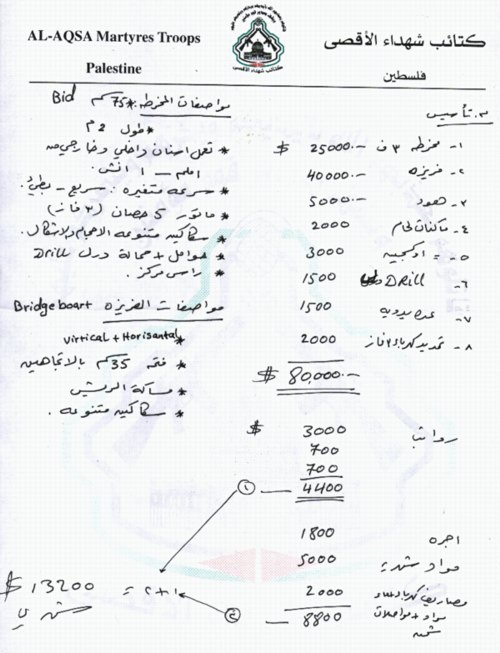
Note: Information on these "document" pages obtained from the IDF web site.
Arafat’s compound in Ramallah houses the office of Fuad Shoubaki, the accounting administration of the Palestinian General Security Service. Shoubaki is the chief procurement and finance officer of the Palestinian Authority and was one of the key players involved in the “Karine A” arms smuggling affair.
Shoubaki’s previous office was located 100 meters south of Arafat’s office. Following the “Karine A” affair, Shoubaki was arrested and interrogated in the office of the Head of the General Intelligence Service Tiraawi, which is adjacent to Chairman Arafat’s office. This is one of the offices IDF forces entered as a part of the Wall of Defense operation (April, 2002).
Inside Tiraawi and Shoubaki’s office building, IDF forces found a large amount of weapons (including RPG launchers) which the PA is forbidden to possess, according to its agreements with Israel. IDF forces also found counterfeit money as well as documents belonging to Fuad Shoubaki. These prove that Shoubaki continued to operate “business as usual” in the Moukata compound, even after his involvement in the “Karine A” affair (January, 2002) was discovered.
Shoubaki is close to Chairman Arafat and often accompanies him as a part of official Palestinian delegations to Arab countries. He also holds private meetings in countries willing to support the Palestinian terrorist efforts, such as Iraq, which he visited in November 2001.
Fuad Shoubaki is also in charge of financing the “Fatah” branches, which carry out terrorist activities under a cover name – “the Al-Aksa Brigades”.
Evidence found by IDF forces in the course of the present operation in Ramallah established a clear link between Shoubaki and the Al-Aksa Brigades.
Original documents seized by the IDF in the “Moukata“ compound reveal that the Al-Aksa Brigades is an established organization, which holds official correspondence with Fuad Al-Shoubaki’s office in order for it to finance its planned operations. This money does not go merely to finance propaganda concerning terrorists involved in attacks, but also to control the planning of future attacks. One document captured in Ramallah, for example, is a request from Al-Aksa officials, dated September 16th, asking Shoubaki for money to prepare bombs – “the costs of making one explosive charge is at least 700 NIS. Each week, we require 5 to 9 charges for cells operating in the various regions”.
A handwritten document found in the same office, translates this request to monetary terms using a simple method of calculation: an average of 7 bombs a week = 5,000 NIS a week or 20,000 NIS per month.
Shoubaki also provided ongoing funding for the activity of the Al-Aksa Brigades in the Bethlehem region, when he transferred monthly salaries to the organization’s activists in the area. Also, he was involved in purchasing weapons, which were stolen towards the end of the year 2000 from an IDF base in the area. These weapons were later used to carry out attacks against Israeli civilians in the area of Jerusalem.
Shoubaki was active in other regions as well and had been involved in smuggling arms from Jordan and Egypt (via underground tunnels).
The Al-Aksa Brigades organization carried out suicide and “Self Sacrifice” (terrorist shooting) attacks in growing numbers in the last six months: After carrying out only two attacks towards the end of 2001, the organization adopted a more aggressive and intensive modus operandi involving suicide and shooting attacks. Al-Aksa carried out 4 attacks in January 2002 (in Hadera, Jerusalem and Tel-Aviv); 6 in Febuary (in Mehola, Army Base “80”, Jerusalem, and the Maccabim checkpoint); and 9 in March (in Netanya, Ashdod, Jerusalem, Tel Aviv, Kfar Saba and Efrat).
The growing rate of the attacks corresponds to the plan outlined in the document of September 16, 2001 (5 days after the September 11 attack in the U.S), for the preparation of a large number of explosive charges each month, for which Shoubaki was asked to provide the money.
The “Al-Aksa Brigades” is a cover name assumed by the Fatah to avoid responsibility for its terrorist activities. The organization’s activities are directed by Marwan Barghouti (head of the Tanzim in the West Bank), who passes concrete instructions to Al-Aksa operatives. The Al-Aksa Brigades has recently been declared a terrorist organization by the U.S.
The Al-Aksa Brigades planned infrastructure involves more than just bullets and bombs. An additional letter captured in Shoubaki’s office (see below) details an ambitious plan of this terrorist organization to create a factory for the manufacturing of heavy weapons. Among other things, purchasing a lathe (costing $25,000) and other machines needed to process the metal in order to manufacture weapons such as rockets and mortars. It is known that the Al-Aksa Brigades are producing rockets similar to the “Kassam” rockets made by the Hamas.
The required investment in the weapon factory is $100,000, and the ongoing expenses are measured at $15,000 per month. It is no wonder that these requests are being received by Shoubaki, the procurement and finance officer who seems to have a hand in everything.
The network established by Shoubaki includes Iran and Iraq on the one hand (countries which are a part of the “Axis of Evil”), and branches of the Fatah hiding behind the name “Al Aksa Brigades” on the other.
